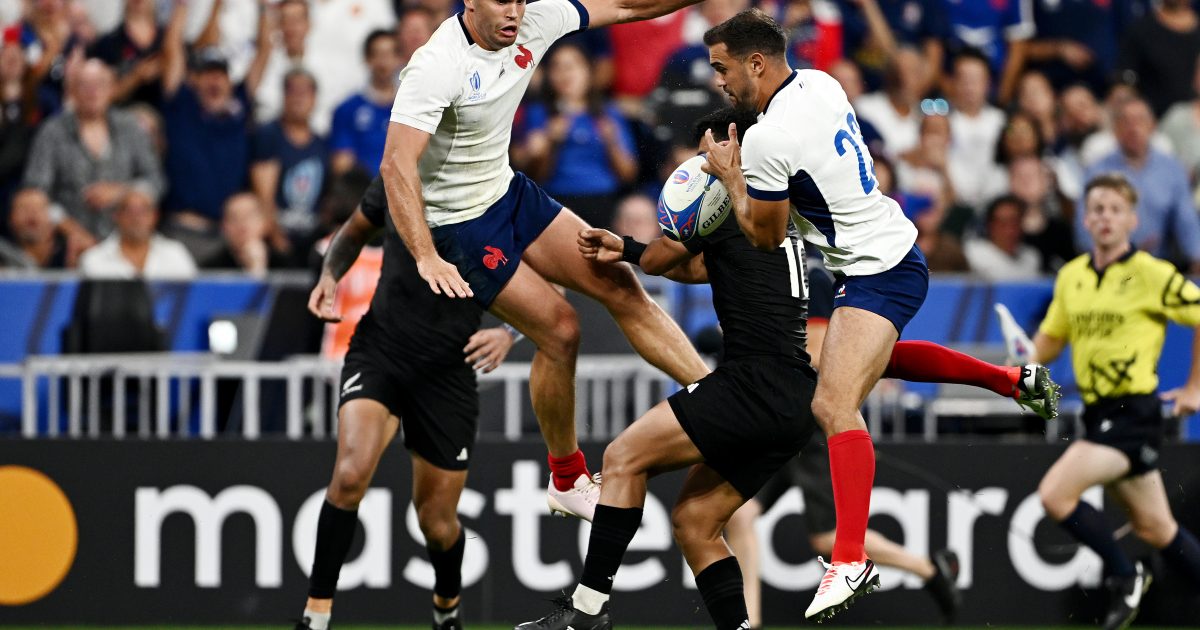La France fait chuter la Nouvelle-Zélande pour la première fois en match de poule

Les Bleus ont joué en mode diesel pour le match d’ouverture de la Coupe du Monde de Rugby au Stade de France face à la Nouvelle-Zélande après deux mi-temps opposées ; une première laborieuse, une deuxième plus prometteuse.
Après une première période assez pauvre avec des Bleus jouant en blanc peu créatifs, subissant les assauts des hommes en noir, les obligeant à jouer au pied pour tenter péniblement de se donner de l’air, la seconde période a remis le XV de France dans l’axe de la victoire.
Alors que la Nouvelle-Zélande n’avait jamais perdu un match de poule de la Coupe du Monde de Rugby, la France n’avait encore jamais mené à la mi-temps face aux All Blacks lors des confrontations en Coupe du Monde de Rugby.
Ce vendredi 8 septembre restera donc dans l’histoire alors que la France menait d’un point à la pause (9-8).
Pendant cette première période, on aura tout vu : les All Blacks qui marquent dans la première minute de jeu (Mark Telea après une passe croisée de Beauden Barrett), trois pénalités de Thomas Ramos sur quatre, Julien Marchand obligé de sortir pour une gêne à la cuisse, la Nouvelle-Zélande malmenée en mêlée sous la pression des piliers rochelais, et des plaquages français manqués à la pelle (22 contre 3 seulement pour les Néo-Zélandais en première mi-temps).
L’avance 9-8 était généreuse après cette entame étouffante – au propre comme au figuré avec 33° C au coup d’envoi – où les deux équipes se rendaient coup pour coup.
Le break a visiblement porté ses fruits pour les tricolores qui semblaient déjà carbonisés après 40 minutes de jeu. Malgré un nouvel essai de l’ailier Telea dans le couloir de Penaud, les Français ont su remettre de l’énergie et de l’envie, commençant à trouver des failles dans la défense adverse, ne lésinant pas en conquête.
Une première tentative de Penaud avortée à quelques centimètres de la ligne a semblé redonner du peps et la deuxième fut la bonne après une belle passe de Jalibert qui permit de fixer la défense adverse à cinq mètres de la ligne.
Ramos a retrouvé sa réussite aux perches (une transformation et deux pénalités), les Blacks ont aligné les pénalités (carton jaune sur Will Jordan), la sérénité est revenue dans le camp français.
Le jeu est resté brouillon dans l’ensemble, avec des relances au pied mal assurées. Mais la France est restée disciplinée (4 pénalités contre 12) et les Blacks ont été moins en réussite sur les plaquages (13 manqués contre 6 pour les Français en seconde période).
Le coup de grâce a été asséné à trois minutes de la fin suite à un turnover après une relance malheureuse de Beauden Barrett, Maxime Lucu dégageant avant que Melvyn Jaminet ne marque avant qu’il ne manque sa transformation.

















































